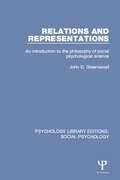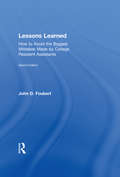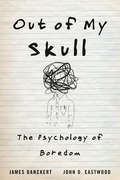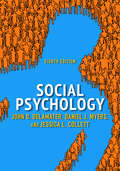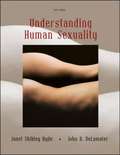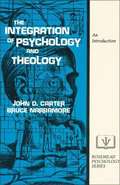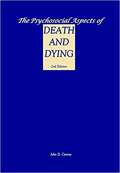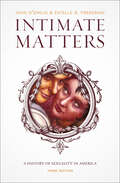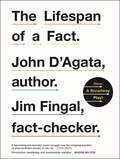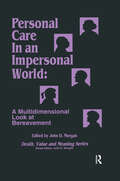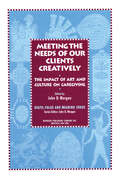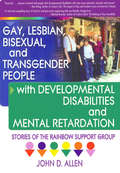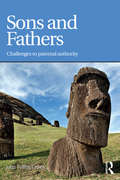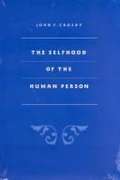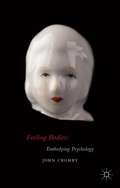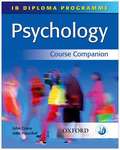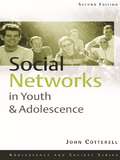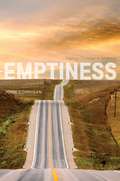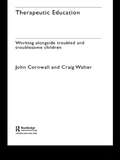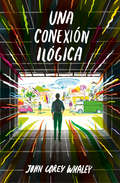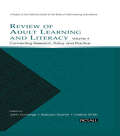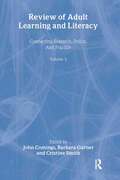- Table View
- List View
Relations and Representations: An introduction to the philosophy of social psychological science (Psychology Library Editions: Social Psychology #12)
by John D. GreenwoodWhat is the nature of social psychological science? What does a realist approach to human behaviour offer? Originally published in 1991, this lucid introduction to the philosophy of social psychological science takes a new and original approach to the subject. The author repudiates traditional empiricist and hermeneutical accounts, advancing instead a realist philosophy of social psychological science that maintains objectivity while at the same time stressing the social dimensions of mind and action. The author provides novel perspectives on the problems and potential of those sciences concerned with human behaviours that are constituted as meaningful actions by their social relational, and representational dimensions. He focuses in particular on the social identity of human actions and psychological states, on the objectivity of theoretical description and causal explanation, and on the role of experimentation. This approach, aimed at reconciling our scientific interest with our human intuitions, results in a richer conception of social psychological theory and phenomena than was found in most contemporary theoretical accounts. A stimulating and thought-provoking text, this title will still be of special value to students and teachers of psychology, sociology, anthropology and philosophy.
Lessons Learned: How to Avoid the Biggest Mistakes Made by College Resident Assistants
by John D. FoubertThe college years can be some of the most vibrant and transformative in an individual’s life, but they are also fraught with uncertainty. The resident advisor or assistant (RA) not only confronts these decisions for him or herself but must also help his or her residents navigate the world of important decisions which the undergraduate experience presents. Lessons Learned is the definitive volume for training RAs to become comfortable with their roles as student leaders. Over four dozen common RA mistakes are discussed, chapter-by-chapter, in the form of individual letters written by experienced RAs to new staff members. Each chapter includes thought-provoking discussion questions, a list of internet and media resources, and additional tips related to each situation. Now in its second edition, this updated volume provides a new overview of student developmental theory and covers a host of new topics, including evolving thought on 21st century predicaments such as social media, texting and the Internet. This is an important text for beginning and experienced RAs, as well as for the university staff who train these crucial pillars of the university community.
Out of My Skull: The Psychology of Boredom
by James Danckert John D. EastwoodNo one likes to be bored. Two leading psychologists explain what causes boredom and how to listen to what it is telling you, so you can live a more engaged life. We avoid boredom at all costs. It makes us feel restless and agitated. Desperate for something to do, we play games on our phones, retie our shoes, or even count ceiling tiles. And if we escape it this time, eventually it will strike again. But what if we listened to boredom instead of banishing it? Psychologists James Danckert and John Eastwood contend that boredom isn’t bad for us. It’s just that we do a bad job of heeding its guidance. When we’re bored, our minds are telling us that whatever we are doing isn’t working—we’re failing to satisfy our basic psychological need to be engaged and effective. Too many of us respond poorly. We become prone to accidents, risky activities, loneliness, and ennui, and we waste ever more time on technological distractions. But, Danckert and Eastwood argue, we can let boredom have the opposite effect, motivating the change we need. The latest research suggests that an adaptive approach to boredom will help us avoid its troubling effects and, through its reminder to become aware and involved, might lead us to live fuller lives. Out of My Skull combines scientific findings with everyday observations to explain an experience we’d like to ignore, but from which we have a lot to learn. Boredom evolved to help us. It’s time we gave it a chance.
Social Psychology
by John D. Delamater Daniel J. Myers Jessica L. CollettWritten by well-known sociologists John D. DeLamater, Daniel J. Myers, and Jessica L. Collett, this fully revised and updated edition of Social Psychology is a highly accessible and engaging exploration of the question #147;what is it that makes us who we are?” Grounded in the latest contemporary research, the book also explains the methods in which social psychologists investigate human behavior in a social context and the theoretical perspectives that ground the discipline. With hundreds of real-world examples, figures, tables, and photographs, the text explores such topics as self, attitudes, social influence, emotions, interpersonal attraction and relationships, collective behavior, and personality. Each chapter is designed to be a self-contained unit for ease of use in any classroom, beginning with focal questions that establish the issues being discussed and ending with a summary of key points, a list of key terms and concepts, and critical thinking questions.
Social Psychology
by John D. Delamater Daniel J. Myers Jessica L. CollettWritten by well-known sociologists John D. DeLamater, Daniel J. Myers, and Jessica L. Collett, this fully revised and updated edition of Social Psychology is a highly accessible and engaging exploration of the question "what is it that makes us who we are?” Grounded in the latest contemporary research, the book also explains the methods in which social psychologists investigate human behavior in a social context and the theoretical perspectives that ground the discipline. With hundreds of real-world examples, figures, tables, and photographs, the text explores such topics as self, attitudes, social influence, emotions, interpersonal attraction and relationships, collective behavior, and personality. Each chapter is designed to be a self-contained unit for ease of use in any classroom, beginning with focal questions that establish the issues being discussed and ending with a summary of key points, a list of key terms and concepts, and critical thinking questions.
Understanding Human Sexuality, Ninth Edition
by Janet Shibley Hyde John D. DelamaterThis trusted text examines the biological, psychological, and social science of human sexuality, provides practical information needed for everyday living, and familiarizes students with research methods used in sexuality. The author team features a unique combination of a psychologist and a sociologist, which gives this text a distinct interdisciplinary perspective.
The Integration of Psychology and Theology: An Introduction
by John D. Carter Bruce NarramoreThe Rosemead Psychology Series is a continuing series of studies written for professionals and students in the fields of psychology and theology and in related areas such as pastoral counseling. It seeks to present current thinking on the subject of the integration of psychology that grow out of the interface of psychology and theology. The data and theories of both theoretical and applied psychology are treated in this series, as well as fundamental theological concepts and issues that bear on psychological research, theory, and practice. These volumes are offered with the hope that they will stimulate further thinking and publication on the integration of psychology and the Christian faith.
The Psychosocial Aspects of Death and Dying
by John D. Canine“Psychosocial Aspect of Death and Dying, which was originally three years in the making, is a unique text. Written specifically for university-level students studying funeral service, it presents in one volume materials from a variety of sources. Dr. John Canine has successfully complied this material into a logical sequence to enable the reader to better understand death from it psychological and sociological perspectives and, with this knowledge, to become better prepared to confront the issues in his or her own life. This text presents the funeral service practitioner with a compact brief on these issues, and as a result offers a ready reference tool.”
Intimate Matters: A History of Sexuality in America
by John D'Emilio Estelle B. Freedman“Fascinating . . . chart[s] a gradual but decisive shift in the way Americans have understood sex and its meaning in their lives.” —New York Times Book ReviewThe first full length study of the history of sexuality in America, Intimate Matters offers trenchant insights into the sexual behavior of Americans, from colonial times to today. D’Emilio and Freedman give us a deeper understanding of how sexuality has dramatically influenced politics and culture throughout our history.“Intimate Matters was cited by Supreme Court Justice Anthony Kennedy when, writing for a majority of court on July 26, he and his colleagues struck down a Texas law criminalizing sodomy. The decision was widely hailed as a victory for gay rights. . . . The justice mentioned Intimate Matters specifically in the court’s decision.” —Chicago Tribune“With comprehensiveness and care . . . D’Emilio and Freedman have surveyed the sexual patterns for an entire nation across four centuries.” —Nation“Comprehensive, meticulous and intelligent.” —Washington Post Book World“This book is remarkable . . . [Intimate Matters] is bound to become the definitive survey of American sexual history for years to come.” —Roy Porter, Journal of the History of the Behavioral Sciences
The Lifespan of a Fact: Now a Broadway Play
by John D'Agata Jim FingalNOW A BROADWAY PLAY STARRING DANIEL RADCLIFFE'Provocative, maddening and compulsively readable' Maggie NelsonIn 2003, American essayist John D'Agata wrote a piece for Harper's about Las Vegas's alarmingly high suicide rate, after a sixteen-year-old boy had thrown himself from the top of the Stratosphere Tower.The article he delivered, 'What Happens There', was rejected by the magazine for inaccuracies. But it was soon picked up by another, who assigned it a fact checker: their fresh-faced intern, and recent Harvard graduate, Jim Fingal. What resulted from that assignment, and beyond the essay's eventual publication in the magazine, was seven years of arguments, negotiations, and revisions as D'Agata and Fingal struggled to navigate the boundaries of literary nonfiction.This book includes an early draft of D'Agata's essay, along with D'Agata and Fingal's extensive discussion around the text. The Lifespan of a Fact is a brilliant and eye-opening meditation on the relationship between 'truth' and 'accuracy', and a penetrating conversation about whether it is appropriate for a writer to substitute one for the other.'A fascinating and dramatic power struggle over the intriguing question of what nonfiction should, or can, be' Lydia Davis
Personal Care in an Impersonal World: A Multidimensional Look at Bereavement (Death, Value and Meaning Series)
by John D MorganThe purpose of this volume is to ask and propose a positive answer to the question: "Can we attend to the personhood of individuals within systems and cultures which are mass oriented?" One of the most interesting changes in contemporary thinking has been the emphasis on the unique person. While the distinction between a person (a unique rational being) and individual (one of several similar things) has long existed, it is in the twentieth century that we seem to have become fully conscious of this distinction. There is good reason for such as emphasis today. Repeatedly in this century the case of the person was deemed less important than some policy. Innocent persons slaughtered in the name of some "ism," political bombings and kidnappings, and mass unemployment to name but a few. The cause of our dehumanization seems to be the reduction of the individual person to a part of the political, economic or religious system.
The Impact of Art and Culture on Caregiving: The Impact of Art and Culture on Caregiving (Death, Value and Meaning Series)
by John D Morgan"Meeting the Needs of Our Clients Creatively: The Impact of Art and Culture on Caregiving" is an important new work which integrates traditional understandings of care of the dying and bereaved with the use of arts and other forms of cultural creativity in therapy and funeralization. Twenty-one authors give us cutting-edge insights into the practical aspects of caring for the dying and bereaved as well as new understandings of creativity.
Gay, Lesbian, Bisexual, and Transgender People with Developmental Disabilities and Mental Retardatio: Stories of the Rainbow Support Group
by John D AllenExperience the birth of the first support group for sexual minorities with developmental disabilities! Reflecting an unprecedented development in the disabled and sexual minority communities, Gay, Lesbian, Bisexual, and Transgender People with Developmental Disabilities and Mental Retardation: Stories of the Rainbow Support Group describes the founding, achievements, and history of a unique group providing support for people with developmental disabilities or mental retardation (DD/MR) who are gay, lesbian, bisexual, and transgender. In this pathbreaking book, group founder John D. Allen describes the Rainbow Support Group's beginnings in 1998 at the New Haven Gay & Lesbian Community Center in Connecticut and the ways in which it has been shattering myths and stereotypes surrounding people with mental retardation ever since. From the author: "Not only are people with DD/MR full human beings with the same needs and desires for intimacy and healthy sexual expression as people without intellectual disabilities, but the group is evidence that some people with DD/MR have an understanding of sexual orientation as well. Acknowledging that people with mental retardation are sexual is a new development in the human service field, but one that is still in the pre-Stonewall days regarding those who are gay. Although people with mental retardation are given unprecedented freedom to make personal vocational decisions, there is an unfounded expectation that they do not have a sexuality-let alone a homosexuality. Members of the Rainbow Support Group discuss the same concerns as other gay people, but in a support system that recognizes their unique perspective." This insightful book shows how membership in the Rainbow Support Group addresses the very real fears and concerns of its members, including: being forced into heterosexual social situations, since that is the only available option for socialization dealing with being "outed" to peers and staff-since many DD/MR people are not their own legal guardians, this can lead to removal of privileges, various kinds of abuse, and other negative consequences in their day-to-day lives being ridiculed by unsupportive staff being excluded from family functions because of their sexual orientation It also illustrates the purely positive aspects of membership in the group, which provides: a place to learn appropriate ways to meet others, hear messages about safe sex, and feel empowered to advocate for their own intimacy needs an increased chance of finding a like-minded partner (although the group is certainly not a "dating service") an avenue for members to connect with others like them and with the larger gay community in the area events to participate in, such as holiday parties, field trips, movie nights, and gay pride celebrations The author continues: "What is exciting are the positive outcomes displayed once an individual enters the group. Members quickly develop a sense of ownership and wear rainbow-emblazoned clothing to meetings. Everyone has joined the host community center to begin receiving regular mailings and event discounts. Supervising staff report that members perform better at work, have fewer behavioral issues, and experience a greater feeling of contentment. For people with mental retardation, just to be able to say the words 'gay,' 'lesbian,' 'bisexual,' and 'transgender' in an affirming environment is a cutting-edge breakthrough. What the group has accomplished and will hopefully continue to illuminate is the understanding that people with DD/MR are entitled to a whole life experience, including discovering and enjoying their sexuality."
Sons and Fathers: Challenges to paternal authority
by John CrosbyFather-son relationships can be notoriously difficult. Often fractious, sometimes hostile, and occasionally destructive, the issue of authority is negotiated by fathers and sons in a range of styles. In this fascinating new book, John Crosby describes the filial relationships of 20 historical figures to illustrate the different ways they related to their fathers, and what this can tell us about love, authority and the wider family context. Sons and Fathers is an approach to understanding this son-father conflict based on early life experience rather than upon psycho-historian or psycho-biographical material and theorizing. Each vignette is designed to be read as a biographical account, but is bookended by a section reflecting on how each man’s relationship to his father can be understood in the context of key developmental theories, in particular those of Eric Erikson and Murray Bowen’s family system theory. The book also includes an extended introduction to both theorists for those unfamiliar with their work, as well as a discussion of the role of corporal punishment as a method of disciplining children. From Michael Jackson to Bing Crosby, Joseph Stalin to John F Kennedy, this is a uniquely accessible but insightful book that will appeal to both general readers as well as students of Developmental Psychology across the lifespan, Family Studies, Marriage and Family therapy, and related subjects. It will also appeal to professionals working in the area, including social workers, counsellors and therapists.
The Selfhood Of The Human Person
by John CrosbyWe often hear it said that "each person is unique and unrepeatable" or that "each person is his own end and not a mere instrumental means." But what exactly do these familiar sayings mean? What are they based on? How do we know they are true? <p><p> In this book, John F. Crosby answers these questions by unfolding the mystery of personal individuality or uniqueness, or as he calls it personal selfhood. He stands in the great tradition of Western philosophy and draws on Aquinas wherever possible, but he is also deeply indebted to more recent personalist philosophy, especially to the Christian personalism of Kierkegaard and Newman and to the phenomonology of Scheler and von Hildebrand. As a result, Crosby, in a manner deeply akin to the philosophical work of Karol Wojtyla, enriches the old with the new as he explores the structure of personal selfhood, offering many original contributions of his own. <p> Crosby sheds new light on the incommunicability and unrepeatability of each human person. He explores the subjectivity, or interiority, of persons as well as the much-discussed theme of their transcendence, giving particular attention to the transcendence achieved by persons in their moral existence. Finally he shows how we are led through the person to God, and he concludes with an original and properly philosophical approach to the image of God in each person. <p> Throughout his study, Crosby is careful not to take selfhood in an individualistic way. He shows how the "selfhood and solitude" of each person opens each to others, and how, far from interfering with interpersonal relations, it in fact renders them possible.
IB Psychology Course Companion: International Baccalaureate Diploma Programme
by John Crane Jette HannibalDeveloped in collaboration with the International Baccalaureate Organization, Oxford's Course Companions provide extra support for students taking IB Diploma Programme courses. They present a whole-course approach with a wide range of resources, and encourage a deep understanding of each subject by making connections to wider issues and providing opportunities for critical thinking. With coverage of the 2007 course outline, this course companion has been written by a principal examiner for IB Diploma Psychology and has been extensively reviewed by teachers, consultants and the IBO. The book contains a unique approach, integrating theory of knowledge and internationalism throughout. Lively and accessible, activities and features are provided for learning and discussion around core and wider issues, and include much needed guidance on study and writing skills. Also included are exam and Extended Essay advice.
Social Networks in Youth and Adolescence (Adolescence and Society)
by John CotterellThis thoroughly revised new edition looks at the nature of social networks, their changing configurations, and the forces of influence they unleash in shaping the life experiences of young people between the ages of 12 and 25 years. The author draws on both social and psychological research to apply network thinking to the social relations of youth across the domains of school, work and society. Network thinking examines the pattern and nature of social ties, and analyses how networks channel information, influence and support with effects on a wide range of life experiences. The book comprises eleven chapters, which contain discussion on key topics, such as youth transitions, network analysis, friendship, romantic ties, peer victimization, antisocial behaviour, youth risk-taking, school motivation, career influence, youth citizenship, and community organizations for young people. Chapters contain discussions of practical ways in which schools can provide support, and suggestions for youth organizations on how to assist young people to become effective citizens.
Social Networks in Youth and Adolescence (Adolescence and Society)
by John CotterellThis thoroughly revised new edition looks at the nature of social networks, their changing configurations, and the forces of influence they unleash in shaping the life experiences of young people between the ages of 12 and 25 years. The author draws on both social and psychological research to apply network thinking to the social relations of youth across the domains of school, work and society. Network thinking examines the pattern and nature of social ties, and analyses how networks channel information, influence and support with effects on a wide range of life experiences. The book comprises eleven chapters, which contain discussion on key topics, such as youth transitions, network analysis, friendship, romantic ties, peer victimization, antisocial behaviour, youth risk-taking, school motivation, career influence, youth citizenship, and community organizations for young people. Chapters contain discussions of practical ways in which schools can provide support, and suggestions for youth organizations on how to assist young people to become effective citizens.
Emptiness: Feeling Christian in America
by John CorriganFor many Christians in America, becoming filled with Christ first requires being empty of themselves a quality often overlooked in religious histories. In "Emptiness," John Corrigan highlights for the first time the various ways that American Christianity has systematically promoted the cultivation of this feeling. Corrigan examines different kinds of emptiness essential to American Christianity, such as the emptiness of deep longing, the emptying of the body through fasting or weeping, the emptiness of the wilderness, and the emptiness of historical time itself. He argues, furthermore, that emptiness is closely connected to the ways Christian groups differentiate themselves: many groups foster a sense of belonging not through affirmation, but rather avowal of what they and their doctrines are not. Through emptiness, American Christians are able to assert their identities as members of a religious community. Drawing much-needed attention to a crucial aspect of American Christianity, "Emptiness" expands our understanding of historical and contemporary Christian practices. "
Therapeutic Education: Working alongside troubled and troublesome children
by John Cornwall Craig WalterThe role of therapy in schools is a topic that has been significantly under-researched and often overlooked. Considering the number of students in full-time education with serious emotional and behavioural difficulties, the skills and tricks used by therapists can be usefully passed on to teachers in the classroom. This book traces a substantial four-year project that applied the principles of therapeutic education in one school setting and exposed how current educational contexts actually contribute to disaffection and disruption of young people's learning. The authors propose a practical model of school and curricular experience, based on therapeutic relationships, that has led to outstanding positive results in school development. With suugestions throughout for tried-and-tested strategies that really work, this book will help professionals turn troubled young people's experience of education from the nightmare it often is, into an adventure with positive results for lifelong learning.
Una conexión ilógica
by John Corey WhaleysSolomon tiene 16 años, es agorafóbico..., pero le va bien. Lisa está dispuesta a todo con tal de entrar a una de las mejores facultades de psicología del país, y «arreglar» a Solomon es justo lo que necesita para conseguirlo, lo quiera él o no. #BibliotecaIndie Solomon es muy fan de Star Trek y se ha embarcado en su propia misión, que dura ya tres años, dos meses y un día. La última frontera para él parece ser el umbral de su casa y la agorafobia lo mantiene encerrado en ella. Aunque Solomon está más que satisfecho siendo el rey de la casa, con el pijama como uniforme y sus padres ausentes casi todo el día. Pero todo cambiará cuando conozca a Lisa. Su sueño es conseguir plaza en la segunda mejor Facultad de Psicología del país (está siendo realista, por eso es la segunda). Está muy segura de sí misma y, junto con su encantador novio Clark, intentará cambiar la vida de Sol. Su amistad será mucho más íntima de lo que esperaban. Pero ¿qué sucederá cuando Sol descubra los planes de Lisa? Divertida y emocionante, Una conexión ilógica aborda las distintas maneras en que nos enfrentamos a nuestros miedos y nos escondemos del mundo, y cómo el amor, la tragedia y la necesidad de conectar pueden ser aquello que nos despierte de nuevo. Reseñas:«Cargada de estilo, sensibilidad y humor... ELECTRIZANTE.»The New York Times «Reirás, puede que llores... y no serás capaz de soltar el libro.»RT Book Reviews «Honesta, divertida e inolvidable.»Buzzfeed «Los capítulos rebosan de diálogos cálidos, inteligentes, auténticos... Los lectores querrán fácilmente a estos personajes brillantes, imperfectos y encantadoramente nerds.»Kirkus Reviews «Si buscáis una novela sencilla, rápidade leer y que os entretenga, esta está genial.» «Una lectura refrescante dentro de lo juvenil. Decir que me ha encantado es poco. En conjunto, este libro ha entrado de cabeza entre mis novelas juveniles favoritas del año.»A body made of words «Una gran reflexión sobre cómo nos enfrentamos a nuestros propios miedos. Una novela apasionante que te hará reír y pasar un buen rato.»
The Good International Citizen
by David Horner John ConnorVolume 3 of the official history of Australian peacekeeping, humanitarian and post-cold war operations explores Australia's involvement in six overseas missions following the end of the Gulf War: Cambodia (1991–99); Western Sahara (1991–94); the former Yugoslavia (1992–2004); Iraq (1991); Maritime Interception Force operations (1991–99); and the contribution to the inspection of weapons of mass destruction facilities in Iraq (1991–99). These missions reflected the increasing complexity of peacekeeping, as it overlapped with enforcement of sanctions, weapons inspections, humanitarian aid, election monitoring and peace enforcement. Granted full access to all relevant Australian Government records, David Horner and John Connor provide readers with a comprehensive and authoritative account of Australia's peacekeeping operations in Asia, Africa and Europe.
Review of Adult Learning and Literacy, Volume 4: Connecting Research, Policy, and Practice: A Project of the National Center for the Study of Adult Learning and Literacy
by Cristine Smith Barbara Garner John ComingsThe Review of Adult Learning and Literacy: Connecting Research Policy, and Practice, Volume 4 is the newest addition to a series of annual publications of the National Center for the Study of Adult Learning and Literacy (NCSALL) that address major issues, the latest research, and the best practices in the field of adult literacy and learning. Volume 4 opens with an overview of significant recent developments in the field. Subsequent chapters cover a wide range of topics critical to the success of adult education and literacy services in the United States: *issues of race, class, gender, and sexual orientation; *the role of workplace education in building adults' basic skills; *the role of new learning technologies in adult education and literacy; *adult developmental theories and their implications for the teaching of adult basic education and English for speakers of other languages; and *traditional and contemporary adult learning theories, including an annotated bibliography of key resources. Intended for policymakers, scholars, and practitioners dedicated to improving the quality of adult basic education, adult English for speakers of other languages, and adult secondary education programs, Review of Adult Learning and Literacy, Volume 4 is an essential resource for the field.
Review of Adult Learning and Literacy, Volume 5: Connecting Research, Policy, and Practice: A Project of the National Center for the Study of Adult Learning and Literacy
by Cristine Smith Barbara Garner John ComingsThe Review of Adult Learning and Literacy: Connecting Research, Policy, and Practice, Volume 5 is the newest volume in a series of annual publications of the National Center for the Study of Adult Learning and Literacy (NCSALL) that address major issues, the latest research, and the best practices in the field of adult literacy and learning.Each Review opens with an overview of significant recent developments in the field of adult literacy during the year, followed by a set of chapters presenting in-depth reviews of research and best practices on topics of high interest to the field. Volume 5 includes chapters on:*the increasing emphasis on scientifically based research and evidence-based practice in education, their use in adult literacy, and the perception of their usefulness by those who work in the field;*recent research on the impact of acquiring a General Educational Development (GED) credential;*the adult literacy system in the state of Massachusetts, focusing on the factors that led to investing and restructuring in the system, and the lessons learned that may be helpful to other states interested in building strong systems of educational service delivery for adult learners;*a history and review of volunteerism in adult literacy;*the history and structure of the adult literacy system in New Zealand, including policy recommendations for the current system to more effectively serve all adult learners; and*a review of theories and key resources related to metacognitive skills in reading.The Review of Adult Learning and Literacy serves as the journal of record for the field and is an essential resource for all stakeholders who need to know what research can reveal about how best to serve adult learners.
